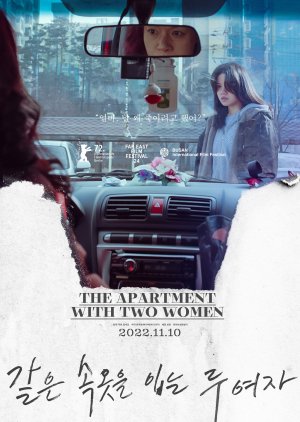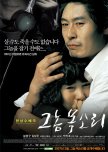
A film that lances the rage and exasperation that can mark a family relationship
At the centre of this very touching social study are a mother and her daughter. They share the apartment mentioned in the title of the film. Besides that, their bond is rather loose. Indeed they could be as well some random flatmates – some that don't get along well. The more Yi-jung (Im Jee-ho) tries to win her mother's affection, the more fiercely Su-kung (Yang Mal-bok), the latter, rejects her.It's nearly embellishing saying that the relationship between the two is tense. They can't communicate without being passive aggressive or snappish. Yi-jung clearly gets on her mother's nerves, but there doesn't seem to be a particular reason for it. Her mere existence seems to provoke Su-kung. Their mutual frustration unloads itself from scene to scene. One of the first confrontations escalates when the two argue, Yi-jung leaves the car and Su-kung in anger steps on the accelerator and hits her daughter from behind.
As a spectator we could have been prepared for this. The camera sits in the car, we have the same perspective as Su-kung watching out of the front window. We feel the tension, we see the contracted muscles of the protagonist. Still her reaction comes unexpected. Why doesn't she come down as most other persons in her situation would have? But no, she really does it. And this is a feeling that stays with the audience during the whole film.
Su-kung doesn't match our expectations. She does not act like we would like a mother to behave. She contradicts the, in most societies nearly holy, ideal of a mother. There is no trace of tenderness towards her daughter. At one point, Yi-jung says to her colleagues from work that she believes her mother would be capable of killing her one day. That evokes an embarrassed silence among the present ones. And they are heavily relieved when they suppose it was only a joke. But in reality it's not that easy.
Yi-jung's situation is desperate. It is difficult for outsiders to relate to her. The love of a mother is considered by most as one of the few things in life on which we can count unconditionally. It is sure a taboo to scratch this certitude. We feel pity for Yi-jung. She has nobody to whom she can turn to. No father, no friends. She longs for affection. In the relationship with her new colleague at work, it appears clear that she doesn't know how to cope with closeness. At the slightest sign of friendship, she tries to hold on to it with all her might. With the result that she scares away the person in front of her.
Director Kim creates with Su-kung a very complex character. She is not only selfish and childish, it is also clear that life wasn't easy on her and that, as a single mother, she faced a lot of criticism from society. She built a cold façade to protect herself. For her friends, she is an entertaining bird of paradise. They envy her supposed freedom. But at the same time, they can't hide the fact that they look down on her. For them not having an intact family life is like failing life's purpose.
Being the portrait of these two women, the cast is of essential importance. Yi-jung is played by Im Jee-ho with a lot of sensitivity. She shows the fragility of the character and the scars that leave its unanswered needs. Still Yi-jung is not a victim, she knows she has to part ways with her mother and finally finds the courage to do so. Even though at some points we would like Yi-jung to react a bit more, to be more combative, we can relate to her at all moments. And this is exactly due to the capability of the actress. It was indeed not easy to stand up to her counterpart. Yang Mal-bok as Su-kung is namely a force of nature. She has recently played in the series “Squid Game”. She manages to evoke contradictory emotions in the spectator. Her character has something despicable, but also touching. Yang whirls through the film like her character through her life. In the moment of calm, we see in her eyes the deep sadness that lies in Su-kung.
Even though the “The Apartment with Two Women” lasts for 140 minutes, it doesn't feel particularly long. This is thanks the precise script containing a density of narrative motifs. The pace of the film is basically calm and not excited, but still each scene has its statement. The framing is well balanced, the camera under the responsibility of cinematographer Moon Myoung-hwan follows the protagonists closely. But it still keeps a certain distance that is necessary to reflect on your own life experience and the evoked emotions.
There are several apartments that are of importance in the film. The first one is the one shared by mother and daughter. Private space is difficult to obtain there for them. The rooms are very close to each other, there is a lot of personal stuff piling up and giving the impression of suffocation. Little light comes in, and the dark furniture supports a gloomy atmosphere. In contrast to the women's apartment, the flat where Su-kung wants to move to with her new boyfriend is brighter and bigger. Also the home of Yi-jung's colleague, even though small, is much more friendly than Yi-jung's and Su-kung's.
Concerning the décor and the setting, director Kim shows the same sensitivity as for the development of her characters. She creates a particularly intimate movie, which is at the same time uncomfortable and often besetting, but also immensely touching. “The Apartment with Two Women” is bewitching. A fantastic first feature from a talented young director, that hopefully will produce more.
Esta resenha foi útil para você?
Really great first try for this young director.
I was able to participate in a talk where the director explained the original meaning of the title. That really blows my mind.I kinda wish the title would remain like the Korean one: "Two women wearing the same underwear". This would let people understand more about the plot from the beginning and what looks weird would just become understandable.
Slow movie but I really recommend it. Really great technique for creating tension.
The value of using silence into long scenes, or disturbing noises too, lets the watchers go into a self-discovery about their own past or present.
You can see the real struggle in a really common family relationship!
Esta resenha foi útil para você?





































